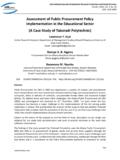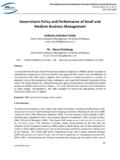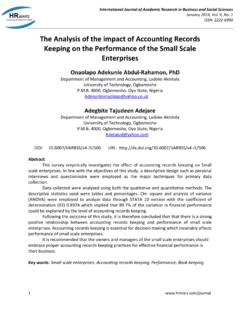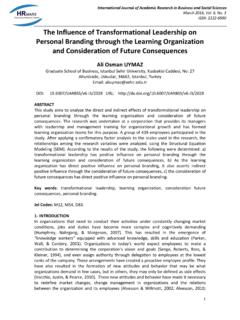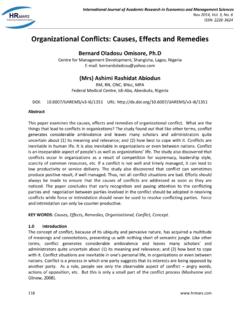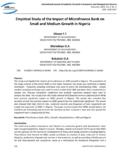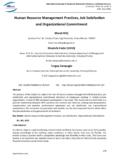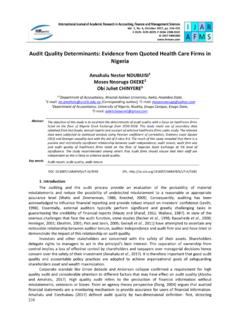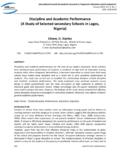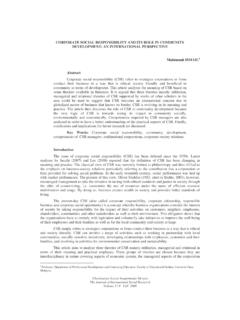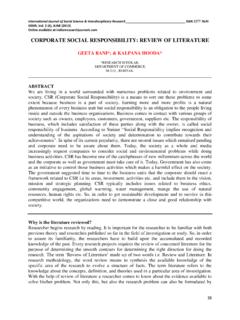Transcription of An Evaluation of factors Influencing Corporate Social ...
1 International Journal of Academic Research in Economics and Management Sciences November 2013, Vol. 2, No. 6 ISSN: 2226-3624 54 An Evaluation of factors Influencing Corporate Social Responsibility in Nigerian Manufacturing Companies Adeyemo DEPARTMENT OF BUSINESS ADMINISTRATION AND MANAGEMENT OSUN STATE POLYTECHNIC, IREE, NIGERIA Oyebamiji DEPARTMENT OF PURCHASING AND SUPPLY THE POLYTECHNIC, IBADAN, NIGERIA Alimi DEPARTMENT OF PURCHSING AND SUPPLY OSUN STATE POLYTECHNIC, IREE, NIGERIA DOI: URL: Abstract Corporate Social responsibility has been recognized as a weapon to survive in global competitive environment. This research paper evaluated factors Influencing Corporate Social responsibility in Nigerian manufacturing companies. The population of the study covered all the staff of the selected manufacturing companies in Ibadan ( Nigerian Breweries, Nigerian Bottling Company, Procter and Gamble, Yale Nigeria limited and Eagle Flour Mill).
2 Purposive sampling method was used to select ten (10) respondents from each organization totaling 50 respondents. Multiple regression was used to analyze the data with the aid of SPSS version 20. The result identified factors that influenced CSR practices as competition, employees demand, government policy, organizational culture, and customer demand ( = , , , ) respectively. The study recommended that organizations should see Social performance as an enlightened self- interest and should therefore handle it with a great concern. Key words: CSR, Manufacturing, Competition, Customer, Nigeria Introduction Corporate Social responsibility (CSR) has been recognized by business organizations globally as a key to business success. Many researchers (Adegboyega and Taiwo, 2011; Kenneth et al, 2010; Greening and Turban, 2000; Fombrun, Gardberg and Barnett, 2000; Sen and Bhattacharya, 2001) have argued that enhanced Social performance may lead to obtaining better resources, higher quality employees, better marketing of products and services and it may even lead to International Journal of Academic Research in Economics and Management Sciences November 2013, Vol.
3 2, No. 6 ISSN: 2226-3624 55 the creation of unforeseen opportunities. They also agreed that better Social performance may also function in similar ways as advertising does, by increasing overall demand for products and services and or by reducing consumer price sensitivity. Konar and Cohen (2001) also agreed that positive Social performance could reduce the level of waste within productive processes. In the same view, Helg (2007) noted that CSR has the potential to make positive contributions to the development of society and businesses. In addition, stakeholder management theories suggest that CSR strategies may lead to better performance by protecting and enhancing Corporate reputation (Fombrun, 2005 and Freeman et al., 2007). Carroll (1979) saw Corporate Social responsibility as a construct with four main components: economic responsibility to investors and consumers, legal responsibility to the government or the law, ethical responsibilities to society, and discretionary responsibility to the community.
4 Meehan et al (2006), in defining Corporate Social responsibility as one multidimensional construct capturing a business organization s configuration of principles of Social responsibility, processes of Social responsiveness, and policies, programs, and observable outcomes as they relate to the firm s Social relationships In Nigeria context, many organizations implemented CSR as a mere superficial window-dressing. It is widely believed by many that CSR efforts are mere campaigns by organizations to promote Corporate brands (Osemene, 2012). Many Nigerians are ignorant of CSR; hence, whenever an organization does something supposedly big for the society, such a company and its management are eulogized for being caring and philanthropic (Fombrum, 2005). According to Osemene (2012) many organizations in Nigeria are driven by the need to make more and more profits to the detriment of all the stakeholders, while some do not adequately respond to the needs of host communities, employees welfare, environmental protection and community development.
5 Research has shown that CSR can increase profitability, sustainability, integrity and reputation of any business that includes it in its policy. Adegboye and Taiwo, (2011) discovered that the activities of civil society organizations in recent years have contributed to the pressure on Corporate bodies to be more responsive in giving back to the society and the environment. The main objective of this research paper is to investigate factors that influence Corporate Social responsibility adoption in Nigerian manufacturing companies. Literature Review The concept of CSR has no one universally accepted definition, and exists in multiple related concepts and terms which are interchangeable with CSR (Kenneth et al, 2010). Baron (2001) argued that Corporate Social Responsibility is an ill- and incompletely defined concept .Definition proposed by the World Business Council for Sustainable Development (WBCSD) (2004) argued that CSR is the commitment of a business to contribute to sustainable economic development, working with employees, their families, the local community and society at large to improve their quality of life.
6 This definition includes the elements that are generally included in empirical work on CSR, such as the community, the environment, human rights, and the treatment of employees. While some of these elements relate to Social dimensions, others focus on stakeholders. According to Garriga and Mel (2004) as cited in Lei, (2011) defined four categories of CSR theories and related approaches: 1) instrumental theories that the International Journal of Academic Research in Economics and Management Sciences November 2013, Vol. 2, No. 6 ISSN: 2226-3624 56 corporation is seen as only an instrument for wealth creation. Friedman s shareholder approach, the strategic CSR approach, and the resource-based approach belong to this category; 2) political theory, which concern the political power of corporations in society. The Corporate constitutionalism approach to CSR and Corporate Citizenship are good examples of this group; 3) integrative theories whose emphasis is on the satisfaction of Social demands, including the community obligation approach, the Social obligation approach, CSP, and the stakeholder approach; and 4) ethical theories, based on the ethical responsibilities of corporations to society, good examples being modern CSR paradigms, the normative approach, and the stewardship approach.
7 Table 1: Evolution of the concepts of Corporate Social responsibility (CSR) Source Concept Focus Prior CSR Sheldon, 1924 The cost of building the Kingdom of Heaven will not be found in the profit and loss accounts of industry, but in the record of every man's conscientious service. Ethical Management Barnard, 1938 Analysis of economic, legal, moral, Social and physical aspects of the business environment. Multiple Aspects Simon, 1945 Organizations must be responsible to community values. Community Relationship 1950s: beginning of CSR Drucker, 1954, Selznick, 1957 Corporate responsibilities as an obligation to pursue those policies, to make those decisions, or to follow those lines of action which are desirable in terms of the objectives and values of our society. Social Obligation 1960s: definition expanding Davis, 1960 Social responsibilities of businesses arise from the amount of Social power that they have.
8 Corporate constitutionalis m Friedman, 1962 The Social responsibility of business is to increase its profits. The shareholder International Journal of Academic Research in Economics and Management Sciences November 2013, Vol. 2, No. 6 ISSN: 2226-3624 57 approach Walton, 1967 Social responsibility recognizes the intimacy of the relationships between the corporation and society and realizes that such relationships must be kept in mind by top managers as the corporation and the related groups pursue their respective goals. Essential element of CR 1970s -1990s: definition proliferating Friedman, 1970 CSR is indicative of self-serving behaviour on the part of managers, and thus conflicts to shareholder benefit. Agency theory Jones, 1980 CSR as the notion that corporations have an obligation to constituent groups in society other than shareholders and beyond that prescribed by law or union contract.
9 Social Obligation Fombrun and Shanley, 1990 Companies should consider CSR as an element of Corporate strategy. Strategic CSR Costin, 1999 CSR as the basic expectations of the company regarding initiatives that take the form of protection of public health, public safety, and the environment. Initiative view 21st century: shifting from 'What' to 'How' Matten and Crane, 2005 Corporate citizenship describes the role of the corporation in administering citizenship rights for individuals. Corporate Citizenship Lindfeldt and T rnroos, 2006 At Corporate level, ethics includes issues on the sustainability of finances, the environment and society. Sustainability Meehan et al., 2006 Three elements are: ethical and Social commitments, connections with partners in the value network, and consistency of behavior over time to build trust. 3C-SR model Source: Lei (2011) International Journal of Academic Research in Economics and Management Sciences November 2013, Vol.
10 2, No. 6 ISSN: 2226-3624 58 factors Influencing Involvement in Corporate Social Responsibility Business organizations are established to produce goods and service that society wants and needs. Windsor (2001) agreed that Social responsibility is achieved when the corporation conforms to the prevailing norms and expectations of Social performance in a given society. Business organization only contributes fully to a society if it is highly efficient, highly profitable and has socially responsible agendas (Coldwell, 2001). Demands for Corporate Social responsibility (CSR) come from external stakeholders, such as communities and societies with general expectations or governments with explicit requirements of Social legitimacy (Wood, 1991). Some of Corporate Social responsibility (CSR) demands come from internal stakeholders, such as moral and relational needs of employees ( Aguilera, Williams, Conley, & Rupp, 2006).
